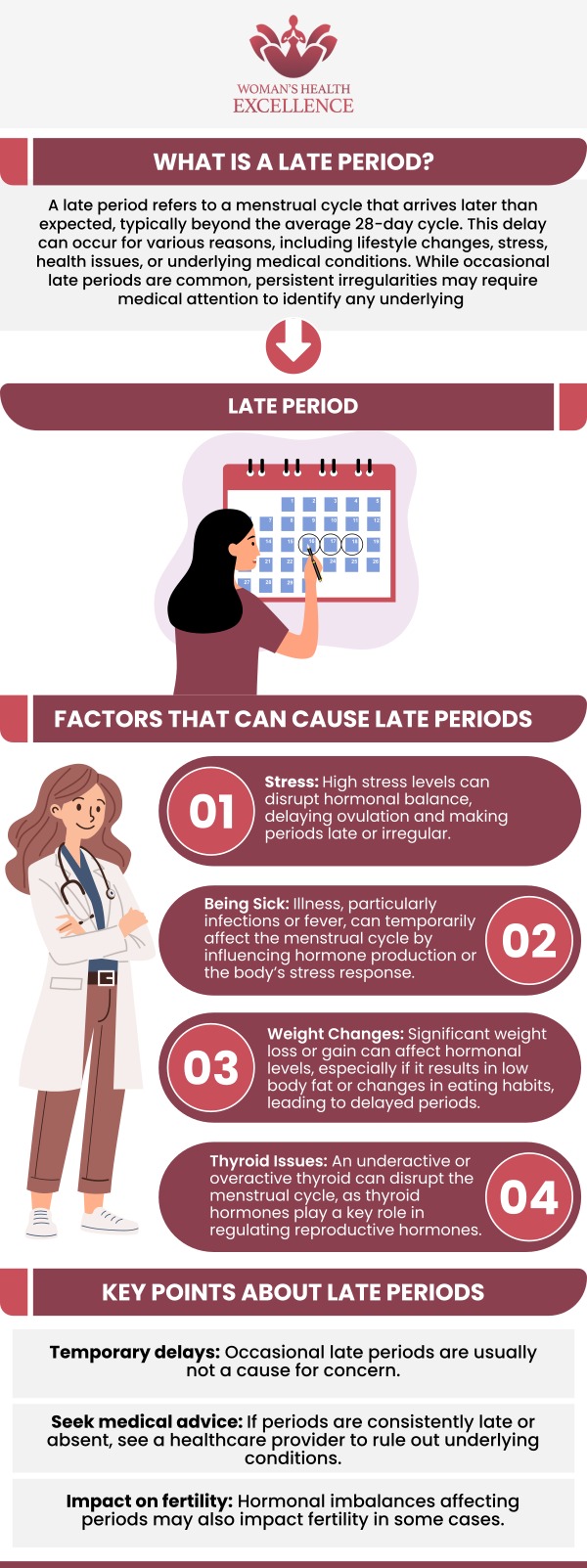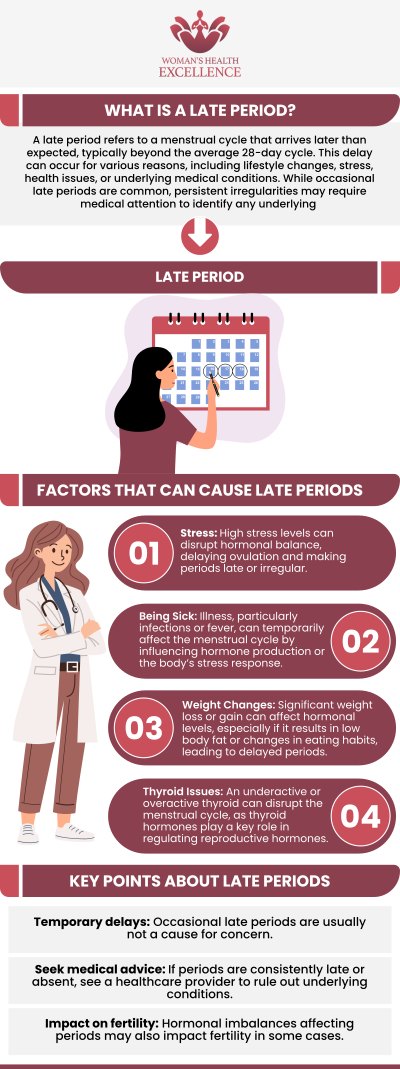How Late Can a Period Be Before You Know You’re Pregnant?
A late period can be a symptom of pregnancy, but it can also be caused by several other things, including stress, sickness, the use of specific drugs, lifestyle changes, and several health issues. If you’re suffering from irregular periods, or believe that you may be pregnant, then visit us at The OB-Gyn & Incontinence Center. Our experienced doctor, Dr. Prema Kothandaraman, MD offers safe, professional, and discrete testing, and can also help you treat your irregular periods. For more information contact us or book an appointment online. We have convenient locations to serve you in Arcadia CA and Glendale CA.




Table of Contents:
How many days late is your period if you’re pregnant?
How do I know if I’m pregnant or if my period is just late?
What are the causes of a late period?
How long after missing your period did you test positive for pregnancy?
When your period doesn’t come on time, it can be distressing. This can be especially concerning if you’re prone to having irregular periods, making it harder to know if your period is just late or if there is something bigger going on.
While some variation is completely normal, with the average menstrual cycle occurring every 24-38 days, it’s always best to check in with your doctor if you have reason to suspect you’re pregnant. The only way to know if you’re pregnant is to get a pregnancy test or a blood test performed, and the most accurate forms of both come from a medical clinic.
If your period is late, don’t press the panic button just yet. While a delayed period can be an early indicator of pregnancy, it can also be caused by other factors such as illness, stress, hormonal fluctuations, and certain types of medication.
It’s also important to note that many women will experience fluctuations in their menstrual cycle at some point in their lives, meaning that the start of their period may vary from month to month. Reproductive and sexual health professionals tout that as long as your cycle comes every 24-38 days, it is considered normal.
However, if you typically have a very regular cycle and you’ve noticed you’re over a week late, then it’s time to either (1) take a pregnancy test or (2) book in with your doctor for testing. The same goes for if your cycle has fallen outside that 24–38-day range.
It’s important to note that the likelihood of getting a false negative from an at-home pregnancy test is much higher within the first two days of a missed period. Therefore, it’s recommended that you wait a week following the expected date of your period before taking one, ensuring the most accurate results.
The only way to know for sure whether you’re pregnant or not is to (1) take a pregnancy test or (2) book in with your gynecologist for a clinical blood test. Blood tests provide a higher rate of accuracy, so most professionals recommend this – especially if you’ve received mixed results on at-home pregnancy tests.
If you don’t have access to immediate testing, take note of how you’re feeling. During the first 8-12 weeks of pregnancy, many women report experiencing symptoms that they would consider to be irregular. This includes:
• Fatigue
• Food cravings and/or aversions
• Frequent urination
• Headaches
• Nausea
• Sore or tender breasts
• Spotting
Outside of being pregnant, there are many other reasons why your period may be late. The regularity of your cycle can be affected by:
• Breastfeeding.
• Drug use.
• Extreme weight variances (gaining or losing).
• High levels of stress.
• Hormone fluctuations.
• Illness.
• Medical ailments (such as PCOS).
• Rigorous exercise routines.
• Taking certain medications.
• The type of birth control you’re on.
• Variations in your sleep schedule.
Even if your menstrual cycle is usually regular, fluctuations are completely normal and are experienced by most women at some point in their lives. However, if a late cycle is causing your physical, emotional, or mental stress, then always book in to see your gynecologist – they’ll help you determine what’s behind it.
When pregnant, the body starts producing a hormone known as human chorionic gonadotropin (hCG). Whether you’re taking an at-home pregnancy test, or are going in for a clinical blood test, this is the hormone that is being tested for. If it’s detected, it’s indicative of pregnancy.
While many at-home pregnancy tests are capable of detecting hCG at any time following the expected date of your period, it’s common to get a false negative within the first few days. Therefore, most medical professionals recommend taking an at-home test one week following your missed period for the most accurate results.
In contrast, clinical blood testing can provide you with an accurate result within 1-2 days of your missed period.
Missing a period can be stressful, especially if you don’t know the cause. At The OB-Gyn & Incontinence Center, we provide safe and professional testing to get you the answers you need on time. For more information contact us or book an appointment online. We have convenient locations to serve you in Arcadia CA and Glendale CA. We serve patients from Arcadia CA, Glendale CA, Monrovia CA, Pasadena CA, Los Angeles CA, Burbank CA and surrounding areas.


Additional Services You May Need
▸ Urogynecology
▸ Minimally Invasive Gynecology
▸ Monalisa & Medical Aesthetics
▸ Bioidentical Hormone Replacement Therapy
▸ Urinary Incontinence
▸ Pelvic Organ Prolapse
▸ Painful Bladder
▸ Urinary Tract Infection
▸ Genitourinary Syndrome of Menopause
▸ Female Sexual Dysfunction
▸ Urinary Retention
▸ Vaginal Laxity & Prolapse
▸ Postpartum Pelvic Floor Problems
▸ PCOD
▸ Bladder Prolapse Repair
▸ Urgent PC
▸ Fibroids
▸ Excessive Bleeding
▸ Pelvic Pain
▸ Birth Control & IUD
▸ Vaginal & Pelvic Infection
▸ Monalisa Touch
▸ STD
▸ TempsureVitalia
▸ Biote Pellet Therapy
▸ Topical BHRT
▸ Flexsure
▸ Rectal Prolapse Repair
▸ Tempsure ENVI
▸ Minimally Invasive Pelvic Surgery for Incontinence



